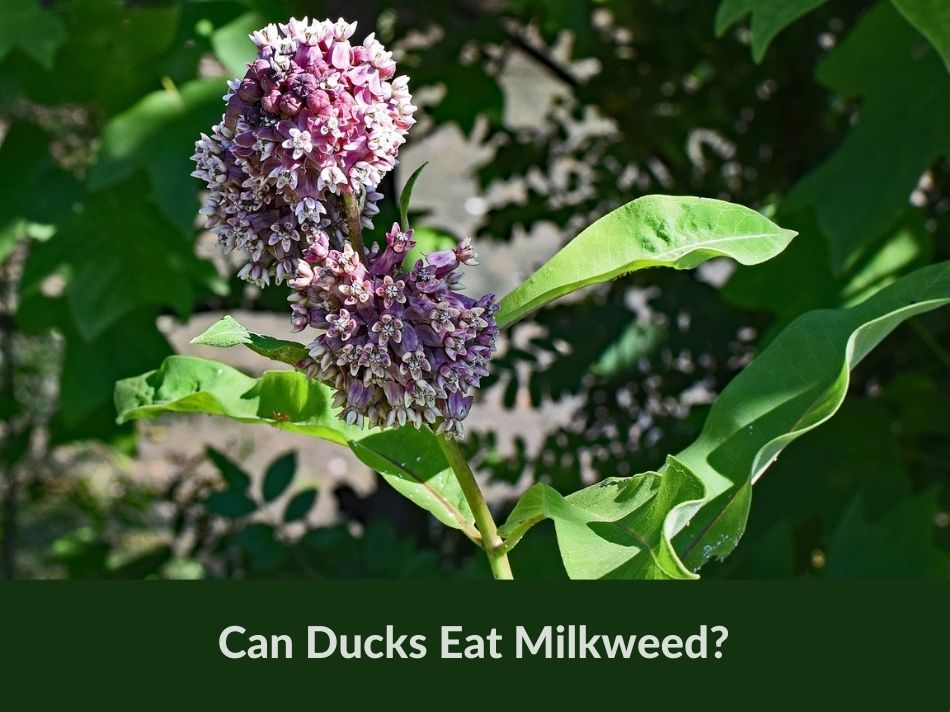In their natural habitat, ducks exhibit omnivorous feeding habits. They forage on a variety of foods, from aquatic plants, insects, small fish, to grains. Their diet is typically determined by their environment, the season, and the specific species of duck. But, can ducks eat milkweed?
No, ducks should not eat milkweed. Milkweed contains cardiac glycosides, which are toxic to ducks. This is a group of poisons that can cause diarrhea, difficulty breathing, lethargy, and in severe cases, death.
In this article, readers will delve into the relationship between ducks and milkweed, examining the plant’s composition, potential toxicity to ducks, and its nutritional value.
What is Milkweed?
Milkweed is a group of plants known scientifically under the genus Asclepias. Predominantly native to North America, milkweed plants can be found in diverse habitats ranging from open fields to forests, wetlands, and even deserts.
These plants are often characterized by their milky sap, which contains latex. This sap gives the plant its common name “milkweed.” Milkweed plants typically have clusters of small, intricate flowers that can range in color from whites and creams to pinks, purples, and oranges, depending on the species.
Beyond its aesthetic appeal, milkweed is of significant ecological importance. The plant is best known for its symbiotic relationship with the monarch butterfly.
Monarch caterpillars exclusively feed on milkweed, and the plant provides them with essential nutrients as well as a defense mechanism; the toxins from the plant make the caterpillars unpalatable to predators.
Is Milkweed Safe For Ducks?
Milkweed, while essential to certain ecosystems and species like the monarch butterfly, poses a complex challenge when considered as a potential food source for ducks. Central to this complexity are the cardiac glycosides found in milkweed.
Cardiac glycosides are naturally occurring compounds found in several plant species, including milkweed. As the name suggests, these compounds primarily affect cardiac (heart) functions.
They exert their influence by interfering with the electrolyte balance within heart cells, which can lead to a variety of cardiac symptoms. In many species, the ingestion of significant amounts of these compounds can lead to heart failure.
Ducks, like many other animals, are susceptible to the toxic effects of cardiac glycosides. If a duck consumes a substantial amount of milkweed, the ingested cardiac glycosides can lead to symptoms such as lethargy, difficulty breathing, diarrhea, and even death in severe cases.
The potency of cardiac glycosides is such that even a relatively small amount might cause adverse reactions, especially in creatures with a faster metabolism, like birds.
Safety Considerations for Ducks
Given the potential risks, ducks typically don’t seek out milkweed as a primary food source. Their instincts and evolved dietary preferences tend to guide them towards safer, more nutritionally beneficial foods.
Yet, if milkweed is abundant and other food sources are scarce, there’s a possibility that they might consume it, leading to potential health issues.
While cases of ducks suffering from cardiac glycoside poisoning due to milkweed consumption are not widespread, the risk remains. It becomes especially pertinent for those who care for ducks in controlled environments to be aware of and mitigate.
Other Flowers Ducks Can Eat
Ducks are not only lovers of various grains, fruits, and vegetables, but they can also be keen on some flowers as a part of their diet. Several flowers are safe and even beneficial for ducks to consume, providing them with essential nutrients and a change in their regular dietary routine.
Below are some other flowers that ducks can safely consume:
Make sure to check out our full list of flowers and plants that ducks can eat.
Conclusion
While milkweed plays a crucial role in ecosystems, particularly for monarch butterflies, it’s not an ideal food source for ducks. Due to its potential toxicity and minimal nutritional benefits, it’s best to keep ducks away from large quantities of this plant.
By understanding the nature of milkweed and its effects on ducks, bird enthusiasts and duck keepers can make informed decisions about their feathered friends’ diet and well-being.
Disclaimer: The information in this article is for informational purposes only. I'm not an expert or a veterinarian.


